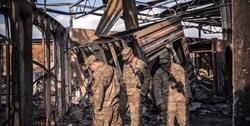 The Pentagon says 50 American soldiers have been diagnosed with traumatic brain injury following Iran’s retaliatory strikes on US bases in Iraq earlier this month, 16 more than the military previously announced.
The Pentagon says 50 American soldiers have been diagnosed with traumatic brain injury following Iran’s retaliatory strikes on US bases in Iraq earlier this month, 16 more than the military previously announced. RNA - “As of today, 50 US service members have been diagnosed" with traumatic brain injury, Pentagon spokesman Lieutenant Colonel Thomas Campbell said in a statement on Tuesday.
Thirty-one of the 50 were treated in Iraq and returned to duty, including 15 of those diagnosed most recently, according to Campbell.
Eighteen of the total were to Germany for further evaluation and treatment, and one was sent to Kuwait and has since returned to duty, he added.
In its previous update on Friday, the Pentagon put the number of those injured after the Iranian strikes at 34.
On January 8, Iran's Islamic Revolution Guards Corps (IRGC) fired volleys of ballistic missiles at Ain al-Asad, a large airbase hosting about 1,500 US troops in the western Iraqi province of Anbar, and another outpost in Erbil, the capital of the semi-autonomous Iraqi Kurdistan.
The missile operation was in response to Washington's January 3 assassination of top Iranian anti-terror commander Lieutenant General Qassem Soleimani, who led the IRGC’s Quds Force.
The assassination also resulted in the death of Abu Mahdi al-Muhandis, who was the second-in-command of Iraq’s Popular Mobilization Units (PMU).
Both commanders enjoyed deep reverence among Muslim nations over their endeavors in ending Daesh’s territorial rule in Iraq and Syria.
Speaking on the morning following Iran's reciprocal military operation, US President Donald Trump had said that "no Americans were harmed in last night’s attack."
"We suffered no casualties, all of our soldiers are safe, and only minimal damage was sustained at our military bases," he added.
The Pentagon had also initially ruled out any casualties from the attack.
847/940